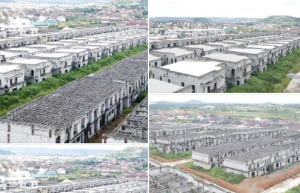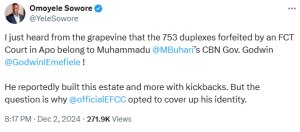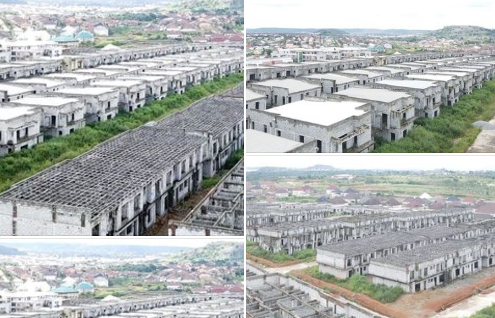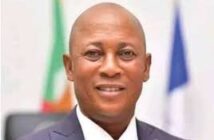
The Economic and Financial Crimes Commission EFCC has given reasons it did not mention the name of the top government official linked to the 753 forfeited duplexes and other properties in Abuja.
The agency had on Monday, December 2, announced that it had secured a landmark judgment for the final forfeiture of an estate in Abuja measuring 150,500 square metres and containing 753 Units of duplexes and other apartments located on Plot 109 Cadastral Zone C09, Lokogoma District, Abuja.
The agency in a statement signed by its spokesperson, Dele Oyewale, said this is the single largest asset recovery by the Economic and Financial Crimes Commission, EFCC, since its inception in 2003. In the statement, Oyewale said the forfeiture of the property to the federal government by a former top brass of the government was pursuant to EFCC’s mandate and policy directive of ensuring that the corrupt and fraudulent do not enjoy the proceeds of their unlawful activities. The agency’s decision not to mention the owner led to speculations with many accusing them of trying to cover up. Former Presidential candidate, Omoyele Sowore, had said that he heard from a grapevine that the owner of the estate is former CBN governor, Godwin Emefiele. He wondered why the EFCC failed to mention the name of the owner of the property.The EFCC has now come out to explain why it did not mention the name of the owner of the property. The agency in its statement denied any coverup. It stated that it would be unprofessional of it to go to town by mentioning names of individuals whose identities are not directly linked to any title document of the properties in question.
‘’The allegation of a cover up of the identity of the promoters of the Estate stands logic on the head in the sense that the proceedings for the forfeiture of the Estate were in line with Section 17 of the Advance Fee Fraud Act which is a civil proceeding that allows for action-in-rem rather than action-in-personam. The latter allows legal actions against a property and not an individual, especially in a situation of an unclaimed property. This Act allows you to take up a forfeiture proceeding against a chattel that is not a juristic person. This is exactly what the Commission did in respect of the Estate.
The proceedings that yielded the final forfeiture of the Estate were products of actionable intelligence available to the Commission. The company flagged by our investigations denied ownership of the Estate following publications made in leading national newspapers. On the basis of this, the Commission approached the court for an order of final forfeiture which Justice Jude Onwuegbuzie of the Federal Capital Territory, FCT, High Court granted on Monday, December 2, 2024.
The expectation of the EFCC from citizen Sowore is a patriotic appreciation of its efforts in securing such a landmark forfeiture. It is shocking that the activist is not concerned about the systemic lassitude and unhelpful permissiveness that allowed such a monstrous corrupt act in the first instance. Nigerians should gear up more against lapses and loopholes in our system that continue to make the nation vulnerable to corrupt tendencies. The EFCC will continue to safeguard the financial space of the nation against manipulators and organised brigandage.
It is important to note that the substantive criminal investigation on the matter still continues. It will be unprofessional of the EFCC to go to town by mentioning names of individuals whose identities were not directly linked to any title document of the properties. The EFCC is unwavering in its no-sacred-cow approach to every matter and together we will make Nigeria greater.




